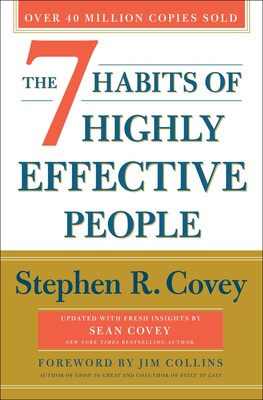
What if your biggest problem isn’t time management, it’s paradigms? Stephen Covey reveals why most productivity hacks fail: they ignore core principles. Highly effective people don’t just manage time; they align actions with unchanging truths. Habit 1: Stop blaming traffic, your boss, or bad luck. You’re the programmer of your life. Ready to rewrite your script? ‘The way we see the problem is the problem.’ Change your habits, change your destiny.
This is a landmark book in personal and professional development, first published in 1989. Covey presents a principle-centered approach for solving personal and professional problems through timeless habits that foster effectiveness. The habits are divided into three stages: Private Victory (self-mastery), Public Victory (working with others), and Renewal (continuous improvement).
Be Proactive
Take responsibility for your actions and focus on what you can control (your “Circle of Influence”). Reactive people blame circumstances; proactive people shape them.
Begin with the End in Mind
Define your personal mission and long-term goals. Imagine your funeral—what would you want people to say about you? Let that vision guide your decisions.
Put First Things First
Prioritize tasks based on importance, not urgency (using the Time Management Matrix). Focus on Quadrant II (important, not urgent) activities like planning and relationship-building.
Think Win-Win
Seek mutually beneficial solutions in relationships. Reject win-lose mentalities; life is not a zero-sum game.
Seek First to Understand, Then to Be Understood
Practice empathetic listening. Most people listen to reply, not to understand. Diagnose before you prescribe.
Synergize
Value differences and collaborate creatively. The whole is greater than the sum of its parts (1+1=3).
Sharpen the Saw
Renew yourself regularly in four dimensions: physical (exercise), mental (learning), social/emotional (relationships), and spiritual (reflection).
Covey emphasizes that true effectiveness comes from aligning actions with universal principles (like fairness and integrity) rather than quick-fix techniques. The first three habits build independence; the next three foster interdependence; and the seventh habit ensures continuous growth.
The book blends philosophy (Covey draws on Viktor Frankl and Aristotle) with practical tools (like the “Emotional Bank Account” metaphor for relationships). Its enduring appeal lies in its holistic approach—success isn’t just about productivity, but about character and purpose.